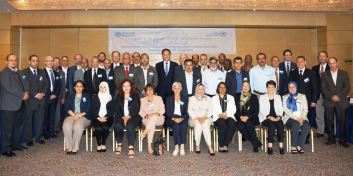28 April 2016 -- Viral hepatitis represents a considerable public health challenge in the WHO Eastern Mediterranean Region, with hepatitis B and C causing more deaths than HIV, malaria or tuberculosis. Every year, around 800 000 people are infected with hepatitis C virus in the Region. An estimated 17 million people currently suffer from chronic hepatitis C. Representatives of the ministries of health, civil society, patient groups, the private sector and regional and global experts in the field of viral hepatitis control and treatment convened in Casablanca, Morocco, from 25 to 27 April 2016 for the Strategic and technical consultation on viral hepatitis in the Eastern Mediterranean Region, to discuss strategies to control viral hepatitis.
Within the context of the global commitment to the Sustainable Development Goals, world leaders have committed to the control of viral hepatitis. Accordingly, the draft WHO Global Health Sector Strategy on viral hepatitis, which will be presented to the World Health Assembly in May 2016, sets an ambitious target of eliminating hepatitis C by 2030. Furthermore, with the advent of the new highly effective direct-acting antivirals for viral hepatitis C, countries and patient groups are increasingly demanding support to avail this treatment to those who need it. However, the prohibitive price of direct-acting antivirals represents a major barrier to access to this life-saving treatment.
Participants at the consultation are being updated on the latest global and regional epidemiological figures related to hepatitis B and C. Global experts presented epidemiological and economic modelling of hepatitis control which builds the case for investing in hepatitis prevention and treatment. The current state of the response, assessed by the WHO Regional Office, was also presented and discussed. Furthermore, the latest WHO guidance on the topic was presented and representatives of countries with advanced hepatitis control strategies shared their country experiences as best practice examples.
Furthermore, and in response to Member States’ concern regarding the prohibitive prices of direct-acting antivirals, one full day has been dedicated to discuss the general and country-specific issues of access to medicines and strategies for price reduction depending on the different patent landscape scenarios in each country. Best practices from Egypt and Morocco were shared as examples. In line with this discussion, the participants discussed the theme of World Hepatitis Day 2016, which is intended for advocacy on direct-acting antivirals and the need to reduce their prices.
Lastly, the participants at the consultation meeting discussed the draft regional action plan for the health sector response to viral hepatitis, focusing on hepatitis B and C, and provided input for its finalization. The regional action plan identifies 5 strategic directions comprising: 1) leadership and governance; 2) information for focus; 3) interventions for impact; 4) health system strengthening; and 5) financing for sustainability.









